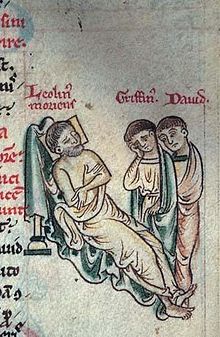Llewellyn (name)

Prince Llywelyn of Wales at his death in 1240, with his sons Gruffydd and Dafydd mourning. Llywelyn is spelt Léolin above his head in the French manuscript.
|
|
| Pronunciation | Welsh pronunciation: [ɬəˈwɛlɪn] |
|---|---|
| Word/name | Old British |
| Meaning | Evolved from Lugubelinos, a compound of two Old British names for Celtic gods: Lugus and Belenus. |
| Region of origin | Wales |
| Related names | numerous |
Llywelyn (Welsh pronunciation: [ɬəˈwɛlɪn]) is a Welsh personal name, which has also become a family name most commonly spelt Llewellyn. The name has many variations and derivations, mainly as a result of the difficulty for non-Welsh speakers of representing the sound of the initial double ll (a voiceless alveolar lateral fricative).
The name Lewis became closely associated with Llywelyn as early as the 13th century, when Anglo-Norman scribes often used the former as an anglicised version of the latter; many Welsh families came to do the same over the following centuries as the adoption of formal English-style surnames became more widespread.
The name evolved from the Old British name Lugubelinos, which was a compound of two names for Celtic deities. The first, Lugus, is also the source of the first element in the names and Lliwelydd, and, as an independent name, evolved into Welsh Lleu. The second element, Belenus, evolved as an independent name into Welsh Belyn.
The name Llywelyn became popular following the successes of Llywelyn the Great (r. 1175-1240), but was largely absent among Welsh princes prior to him. Although Llywelyn was the most common form of the name in the medieval period, variant spellings started emerging even in the early Middle Ages, in particular Llewelyn and Llewellyn, spellings that gave rise to a folk belief that the name was connected with lions (the Welsh word for lion being llew). This belief was further reinforced by Llywelyn the Great's adoption of his father Iorwerth ab Owain's coat of arms, incorporating four lions. The association also produced another early variant of the name, Leoline (based on Latin leo), commonly used in Norman French and French manuscripts. In medieval Latin manuscripts, the form Lewelinus was used.
...
Wikipedia
